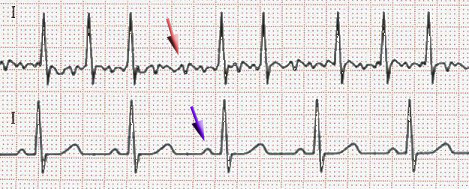Thyroid issues with GLP1?
Do GLP1 Receptor Agonists (Ozempic, Wegovy, Mounjaro, Zepbound, and others) cause thyroid issues?

We're always on the look out for negative side effects of GLP1 Receptor Agonists.
Check out our quick explainer
It's easy to get caught in the upside, but knowing the negative side effects are just as important (if not more) than knowing the positive side effects.
5 second intro to the Thyroid
Your Thyroid is here:

Don't worry if you don't look exactly like the picture.
The job of your Thyroid is to produce hormones (loosely: chemicals that act as signals in your body), and cause your body to perform specific functions.
Here's a quick (old, but good) video to get you up to speed on the basics:
The case of Atrial Fibrillation & Thyrotoxicosis
Don't worry, the words sound very difficult but they basically mean two things:
- Atrial Fibrillation = Fast & Irregular heart rate
- Thyrotoxicosis = Hyperthyroidism = An overly active thyroid (producing an excessive amount of hormones)
You can read about them both online:


The 62 year old patient case study
There was a case study which found a 62 year old man experienced atrial fibrillation (a heart attack):

The facts of this case study are somewhat specific though:
- The patient was predisposed to hypothyroidism (under-active thyroid)
- The patient was prescribed with Levothyroxine (a synthetic form of thyroid hormone, used to treat deficiencies)
- The patient started taking GLP1 (Tirzepatide – active ingredient in Mounjaro and Zepbound)
This lead to an over production of thyroid hormones – which caused an irregular heart rate.
While of course, the outcome isn't nothing , there's less of outright danger due to GLP1s and more a combination of multiple factors causing an issue.
Association with Thyroid Cancer
The other commonly cited issue with GLP1s and Thyroids has been a possible link to Thyroid Cancer.
Papers like the following were first to start the trend/note the possibility of an issue:

It turns out, GLP1s are not significantly associated with Thyroid cancer.
It took a year to get some research that could stand behind that assertion though –

The important bits are the result:
Results The mean follow-up time was 3.9 years (standard deviation 3.5 years) in the GLP1 receptor agonist group and 5.4 years (standard deviation 3.5 years) in the DPP4 inhibitor group. 76 of 145 410 patients (incidence rate 1.33 events per 10 000 person years) treated with GLP1 receptor agonists and 184 of 291 667 patients (incidence rate 1.46 events per 10 000 person years) treated with DPP4 inhibitors developed thyroid cancer. GLP1 receptor agonist use was not associated with increased risk of thyroid cancer (hazard ratio 0.93, 95% confidence interval 0.66 to 1.31; rate difference −0.13, 95% confidence interval −0.61 to 0.36 events per 10 000 person years). The hazard ratio for medullary thyroid cancer was 1.19 (0.37 to 3.86). In the additional analysis comparing the GLP1 receptor agonist group with the SGLT2 inhibitor group, the hazard ratio for thyroid cancer was 1.16 (0.65 to 2.05).
Given a study of over 145,000 patients, it seems that the risk of GLP1s being explicitly linked to Thyroid cancer has been somewhat put to rest.
We're always on the look out for more information on negative side effects associated with GLP1 Receptor Agonists, but for now, it seems like GLP1s aren't unduly negatively affecting thyroids.







